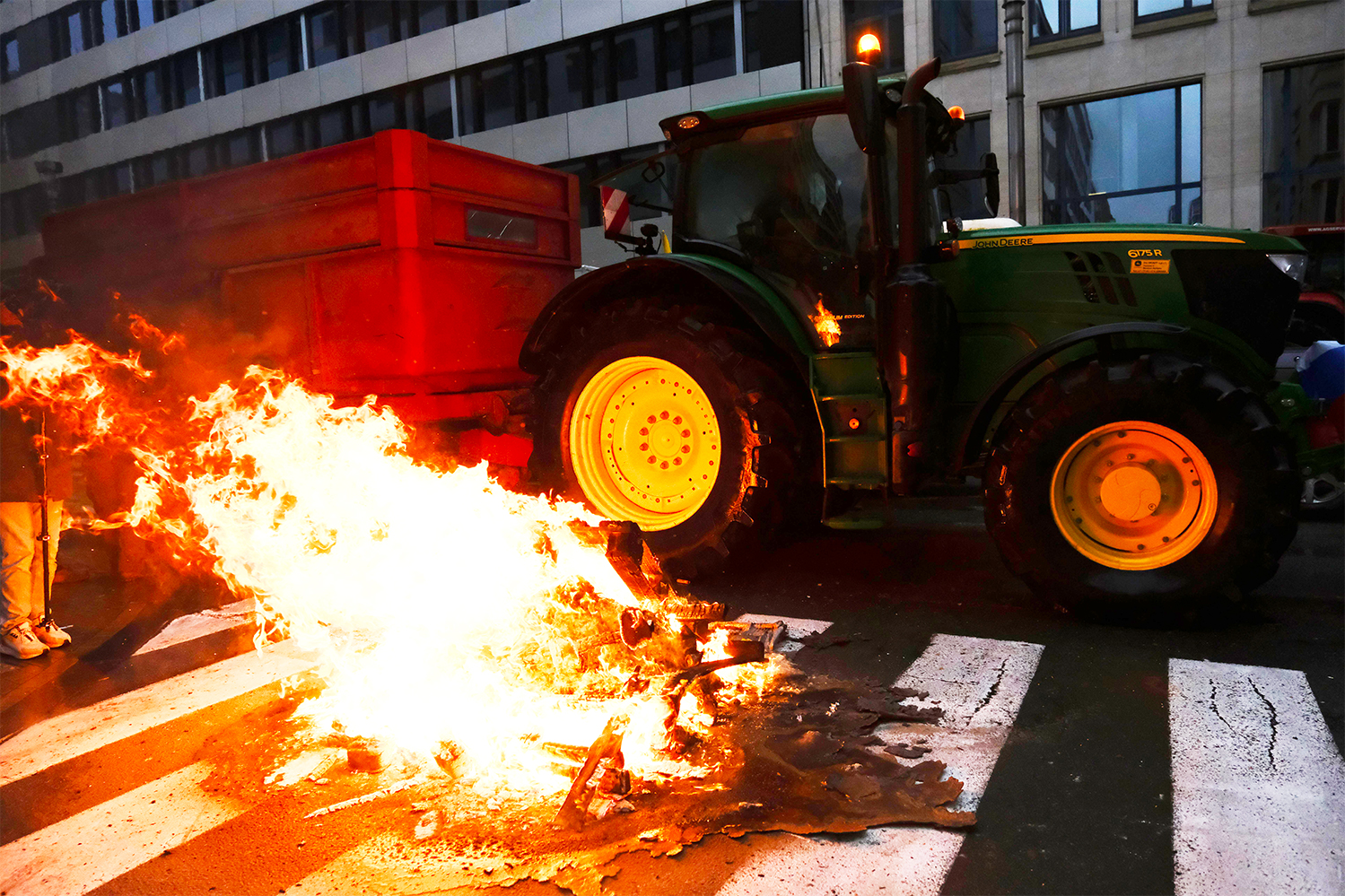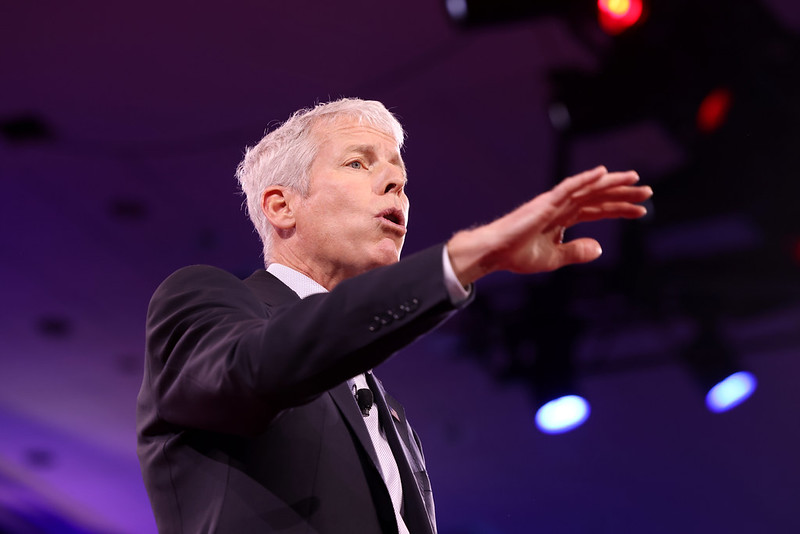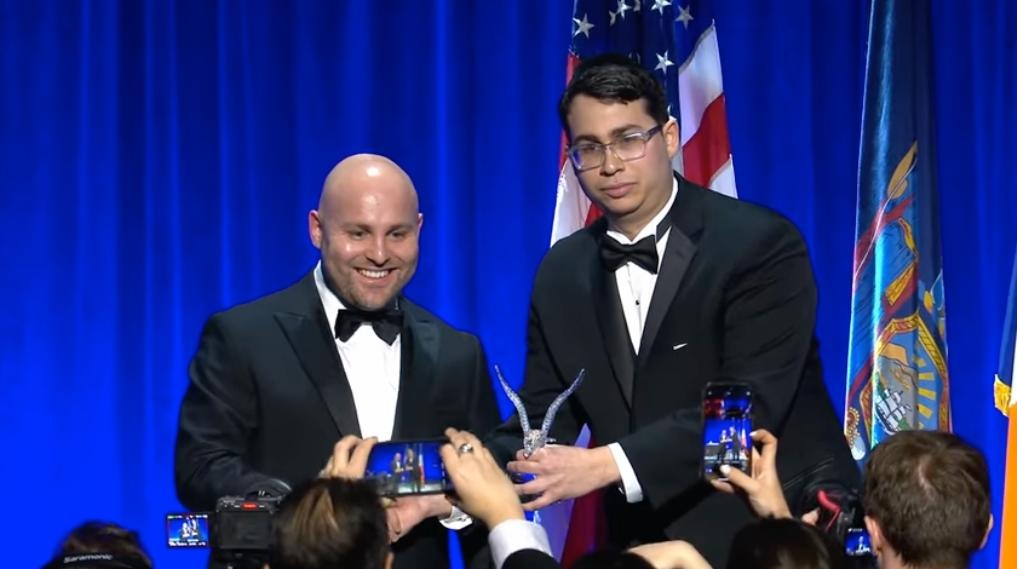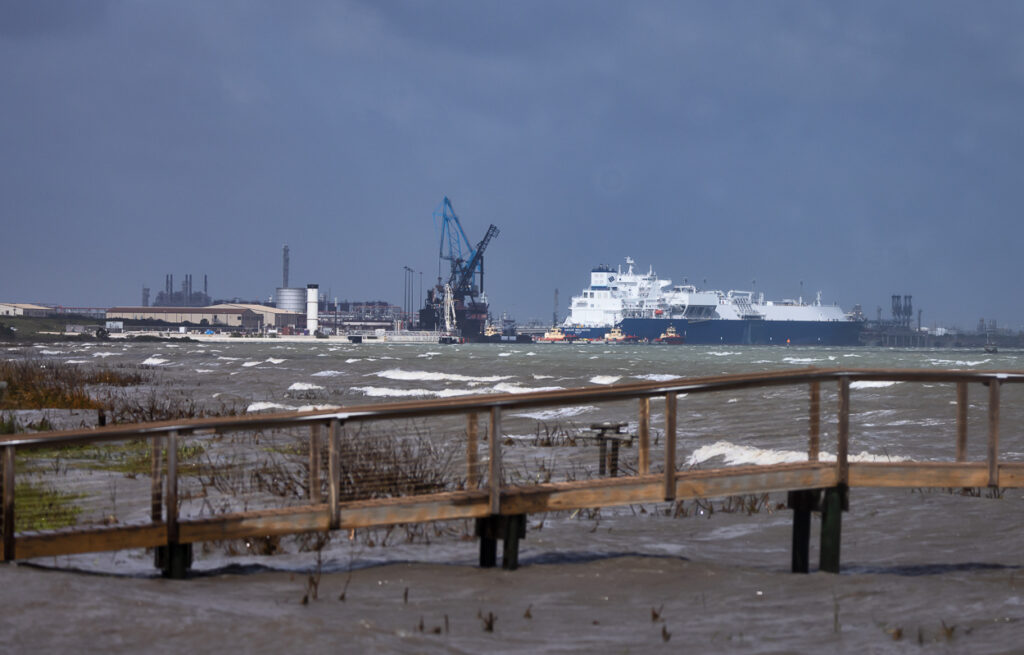Europe’s largest farming unions representing millions of agricultural workers have rejected calls to join next week’s protest against EU green reforms, DeSmog can reveal.
Smaller groups have also shunned the demo – some wanting to avoid the prospect of violence, others claiming they didn’t know it was happening.
Preparations for the June 4 demo have been ramping up ahead of the start of the EU elections next Thursday, with protesters set to gather in Brussels days before European citizens head to the polls.
The hardline Dutch group Farmers Defence Force (FDF) has urged farmer “warriors” to attend the demo, with its spokesperson claiming: “we are defending the rights of farmers and the standards of the European Union as it’s supposed to be”.
This latest protest, spearheaded by far-right linked farmers’ groups, comes months after a wave of demonstrations swept through Europe. Standing alongside dense tractor blockades, farmers expressed a wide range of concerns from low supermarket prices to the cost of living, fuel taxes, and EU subsidies.
Calls by a number of major farming unions and other protesters to reform the EU’s green rules (the ‘Green Deal’) were heeded by Europe’s politicians, leading to a major weakening of the bloc’s climate legislation.
In the wake of these concessions, the appetite for anti-EU protests appears to have faltered.
DeSmog has spoken to multiple farming unions across the EU, many of which have ruled out attending next week. Most prominent among them is Copa-Cogeca, the EU’s biggest farming union, which is controversial among many EU farmers and has a history of lobbying politicians against green reforms.
DeSmog also spoke to smaller farming groups in Italy, Germany, Poland, France, Spain, and the Netherlands, learning a variety of reasons for their absence.
Farmers across Europe have traditionally been understood as a unified force, and protests at the start of the year were often presented as an unanimous response to EU climate action. However, many groups have eschewed the upcoming demo, and farmers have voiced growing discontent with some of the forces driving the protest.
Many groups acknowledged that the EU had conceded to their demands already, so the urgency to protest had faded. Others sought to draw a line between themselves and the hardline groups leading the charge, while some shared their concerns over the dominance of big unions.
With the votes fast approaching, here’s what groups across Europe have planned for June 4, and how the bloc’s diverse group of farmers have responded.
Italy
The main farmers’ organisations in Italy – in particular the country’s largest agricultural associations Coldiretti and Confagricoltura – enjoy a close relationship with the government and the national conservative party Brothers of Italy.
DeSmog spoke to representatives of these two groups, as well as the smaller farmers’ association CopAgri, and union Cia. These groups, which are all part of Copa-Cogeca, confirmed that they would not be taking part.
Despite their links to right-wing politicians, they told DeSmog that they were critical of the new right-wing and far-right linked European farmers’ movements.
The groups behind these movements – such as the Dutch Farmers Defence Force, France’s Coordination Rurale, and Spain’s Plataforma 6F – were too closely associated with the far-right, they said.
Coldiretti and Confagricoltura said they were advised by Copa-Cogeca not to participate, while Cia claimed they were not even aware that the protest was taking place. (Copa-Cogeca has not yet responded to DeSmog’s requests for clarification).
Some smaller groups have confirmed they will be taking part, such as Movimento Produttori Italiani, which was founded in January this year to counter the demands of Coldiretti. The group, which represents around 500 farmers, is allied with the Farmers Defence Force.
Movimento claims that Coldiretti is pursuing the personal interests of its leadership instead of protecting the farming sector.
In a statement to DeSmog, Ettore Prandini, president of Coldiretti, said they had “repeatedly demonstrated peacefully in Brussels, successfully obtaining significant interventions in favour of the agri-food sector through dialogue and institutional discussion”.
Movimento’s leader, Salvatore Fais, said that 3,500 tractors and about 20,000 people from across Europe are expected on June 4, including around 460 people from Italy. A dozen tractors are expected to arrive in Brussels from Italy, in contrast to the 900 that were brought to the last major demo in February.
Coldiretti brought around 3,000 farmers to the demonstration in February, while Italy’s Prime Minister Georgia Meloni gave a speech to Confagricoltura in which she promised to concede to the demands of farmers.
The other groups described Movimento as “lone wolves” and “marginal”, but not directly connected with far-right groups.
Cia declined to comment on the group’s motivation for pulling out, stating only that its position “aligns with Copa”.
A spokesperson for CopAgri told DeSmog: “We understand the reasons behind the protest scheduled for June 4 in Brussels, but as we have made clear from the beginning, as a trade union organisation, we can only favour the path of dialogue and political debate.”
The group said it welcomed the April revision of the common agricultural policy (CAP) subsidy, which saw the EU water down environmental demands on farmers. They said that they “will continue this dialogue with the new members of the European Parliament” to make the CAP and other community policies “more efficient and improved”.
Germany
German participation in the June 4 protest is being co-organised by the farmers’ association Landwirtschaft verbindet Deutschland (LsV Deutschland).
The association was borne out of a Facebook group in 2019, when farmers started protesting against stricter environmental and animal welfare regulations introduced by the German government.
LsV Deutschland has established a reputation for radical action. Its members have blocked motorways and Aldi supermarket’s central warehouse in Germany. They have also dumped piles of manure on crossroads, and protested in front of media offices, claiming they lack real representation in the media.
“We use harsh words and push legal limits, so if that means we’re hardliners, that’s what we are,” Marc Bernhardt, spokesman of a regional LsV group, told German media.
LsV Deutschland shared a video promoting the June 4 protest in its Telegram group, calling on its members to head to Brussels. “We go to Brussels because the farmers’ concerns are taken seriously there and laws are changed or withdrawn. That doesn’t happen at all in Germany,” Thomas Antony, the group’s chairman, told DeSmog.
However, LsV Deutschland may end up being the only farming group from Germany to join the protest. Even the group Freie Bauern (Free Farmers), which has close links to LsV Deutschland, has no plans to attend.
Freie Bauern has limited capacity and is currently focusing on politics at the regional and national level, its spokesperson Reinhard Jung told DeSmog. However, he believes that some of its members will be in Brussels on June 4 due to their overlap with the LsV.
Deutscher Bauernverband, a farmers’ union which says it represents 90 percent of the 260,000 farmers in Germany and is a member of Copa-Cogeca, will not participate in the protest. “We don’t know the organisers of the protest, so we can’t recommend our members to join,” said its spokesperson Axel Finkenwirth.
Other groups have also ruled out attending. Some said the protesters are too radical. “I was at the farmers’ protests in Brussels in February. I saw the violence and demonstration of power that many farmers were using. How they flattened barricades. That was very frightening,” said Bernd Schmitz, co-managing director of the farmers association Arbeitsgemeinschaft bäuerliche Landwirtschaft, which represents around 2,500 farmers working on sustainable agriculture.
His association won’t join the protest but Schmitz will attend as an observer. “We are worried about the direction the protest will take,” he said. “The first call from the LsV was quite fierce. That’s why I want to see what’s happening on the ground, what’s being said, which posters are shown.”
The young farmers’ association Bund der Landwirte (BDL), the organic farmers Bund Ökologische Lebensmittelwirtschaft (BÖLW), and the milk farmers’ group BDM will also stay at home.
“Our association wants different things than the farmers that will be in Brussels on June 4,” BDM spokesperson Hans Foldenauer told DeSmog. “We need to move away from intensification and immense competition. And we need to move towards agricultural production that is sustainable and helps us to generate our main income from the sale of agricultural products again.”
BDM is not part of Copa-Cogeca and is critical of the union’s policies. “Copa-Cogeca is responsible for the fact that we are in this bad situation and that we have a poor market position,” Foldenauer said.
Why does he think Copa-Cogeca might be calling on its members not to join the protest? “They fear that smoke will rise on June 4 and they want to prevent that,” Foldenauer said.
Netherlands
The hardline Dutch group Farmers Defence Force, which is spearheading the protest, has urged farmers to come together “to defend our way of life, our culture, our businesses, our families”.
FDF has also shared a list on social media of far-right politicians who will address crowds, including Polish Member of European Parliament (MEP) Dominik Taczynski, and Dutch independent MEP Rob Roos. The list also mentions the appearance of populist Dutch leader Geert van Wilders, and says that former EU climate chief Frans Timmermans is “pending”.
The Dutch farmers association LTO, which has 35,000 members, told DeSmog that it would not be attending the protest. The group said that it preferred to employ different tactics, namely talking and lobbying.
The union referred DeSmog to a statement issued in April, in which they wished the protesters “a good day” and applauded the fact that farmers’ groups were taking multiple kinds of action at the same time.
“That different organisations take action on different moments contributes to our collective power: together we work hard for a good future for our farmers and horticulturists,” they said.
Despite the conciliatory language, there have been rifts between FDF and more traditional farmers’ groups.
Speaking from the interior of a tractor, in an address posted on FDF’s YouTube channel, the group’s leader Mark van den Oever has called the actions of LTO “treason” over the Dutch manure crisis, saying that its representatives are the “little slaves” of campaign groups and the ministry of agriculture – rhetoric previously employed by FDF in describing the big farming unions.
Alex Datema, the previous chair of the farmers’ collective BoerenNatuur and now director of food and agri at the Rabobank (a major financier of the EU farming sector), has been openly critical of FDF. In a post on social media platform X, they said the group’s arguments had “run out”.
Spain
Coordinadora de Organizaciones de Agricultores y Ganaderos (COAG), the largest farmers’ organisation in Spain, representing more than 150,000 farmers across the country, has said that its members will not join the protest on June 4.
“We plan our advocacy independently from what other non-recognised platforms are doing. We are recognised by law (as representatives of farmers), and we act accordingly,” said secretary general Miguel Padilla. However, he claimed that, despite some concessions made by the EU and the Spanish government, “there is still a lot to fight for”.
In February 2023, a new group called Platform 6F, which is connected to the far-right political party Vox, organised dozens of farmers’ protests in Spain. Other farmers’ unions, including COAG, followed suit and called for action.
However, since then, the traditional farmers’ unions and Platform 6F have grown apart. Platform 6F is the only organisation in Spain that has announced that it will join the protest in Brussels.
The Small and Young Farmers Association (UPA) also joined the protests in February but will not participate in June. UPA, representing 80,000 farmers, has said that the EU has made satisfactory concessions after the protests earlier this year.
“They made decisions to make the CAP more flexible in line with what we were asking for”, UPA spokesperson Diego Juste told DeSmog. When asked about the 4th June protest, he said “We have nothing to do with that”.
DeSmog also interviewed a number of individual farmers who said they are not planning to join the protest. Some, such as Javier Díez, a cereal farmer originally from Guadalajara, said that he couldn’t join any protest at the moment because he is “too busy working” on his land.
“There is not much being planned. People are really tired now. There were many protests in the past months, and we spent a lot of money on this”, added Santiago, a seller of farming machinery and one of the main organisers of local protests in February.
Others, such as Eduardo Vera, a rice farmer from Andalucía, says he would only join protests if they are legal. “In February there were many protests that didn’t have the permits and we didn’t even know who was really organising them,” he said. In Spain, it is mandatory to inform authorities at least 24 hours before a protest.
France
Coordination Rurale, France’s second largest farmers’ union, is among the groups helping to organise the June 4 protest.
Amid a sudden wave of interest in farmers’ protests, the group – established in 1991 – has grown from having a mostly local profile to having a prominent role in national debates. It was at the forefront of the agricultural demonstrations that began in rural France earlier this year.
The group is closely affiliated with France’s leading far-right party, the Rassemblement National (National Rally), which is polling to win a third of all the seats being contested in France as part of the EU elections. French President Emmanuel Macron told journalists in March that the union’s local decision makers are “very officially involved with the Rassemblement National”, and French environmental outlet Reporterre has characterised the group as having “values compatible with the extreme right.”
Coordination Rurale co-organised farmers’ protest in Brussels in January alongside the oil funded think tank MCC Brussels. It also attended an MCC Brussels-hosted planning meeting for the June 4 protest alongside groups such as the Farmers Defence Force.
While Coordination Rurale is planning on joining other far-right aligned groups in attendance at the June 4 protest, France’s largest union – the Fédération Nationale des Syndicats d’Exploitants Agricoles (FNSEA) – told DeSmog it is unlikely to attend.
A FNSEA representative said that she would be “very surprised” if the group was planning on attending. FNSEA is the largest regional farmers’ group in the EU, and the largest member of Copa-Cogeca, which the spokesperson said would usually coordinate FNSEA’s presence.
Poland
Polish farming groups seem to be the outliers.
NSZZ “Solidarnosc” Rolnikow Individualnych, which has been organising protests against EU green reforms since last year, confirmed it will be attending the June 4 protest in Brussels. Up to 100 members of the group are expected to join, according to leader and farmer Tomasz Obszanski, who refuted allegations that the protest will attract those with links to the far-right.
The group’s May 10 protest in the Polish capital Warsaw attracted 30,000 protesters from across the country.
“We need to show people who they should vote for,” Obszanski, whose movement is also protesting against Ukrainian food imports, told DeSmog.
He was quick to add that farmers are fighting for more than agriculture. He said: “It’s about those values, which are coming back now: God, Honour, Fatherland” – a slogan that’s widely used by Poland’s ultra-conservative groups, and most commonly heard at the country’s Independence Day march.
Sławomir Izdebski, the chairman of OPZZ Rolników i Organizacji Rolniczych – one of the country’s largest farmers’ associations – is sending a 50-person delegation to Brussels.
The small size of the delegation, Izdebski said, was down to the fact that farmers are “working the field, there’s a drought problem, farmers are a bit under the weather, and a trip to Brussels costs money.”
The group is attending the protest in collaboration with the Institute of Agricultural Economy (IGR), which is spearheaded by millionaire and ex-fur producer Szczepan Wójcik.
Wójcik, who supports populist Dutch politician Geert Wilders, shared a poster on social media platform X, depicting a man with a high-vis jacket and an EU flag in tatters, accompanied by the call for farmers to #votethemaway.
The newly formed Orka movement, which secured a seat at the president’s agricultural counsel this week after a 10 day hunger strike inside the Polish parliament, is also heading to Brussels, confirmed unofficial spokesperson Mariusz Borowiak.
Subscribe to our newsletter
Stay up to date with DeSmog news and alerts






